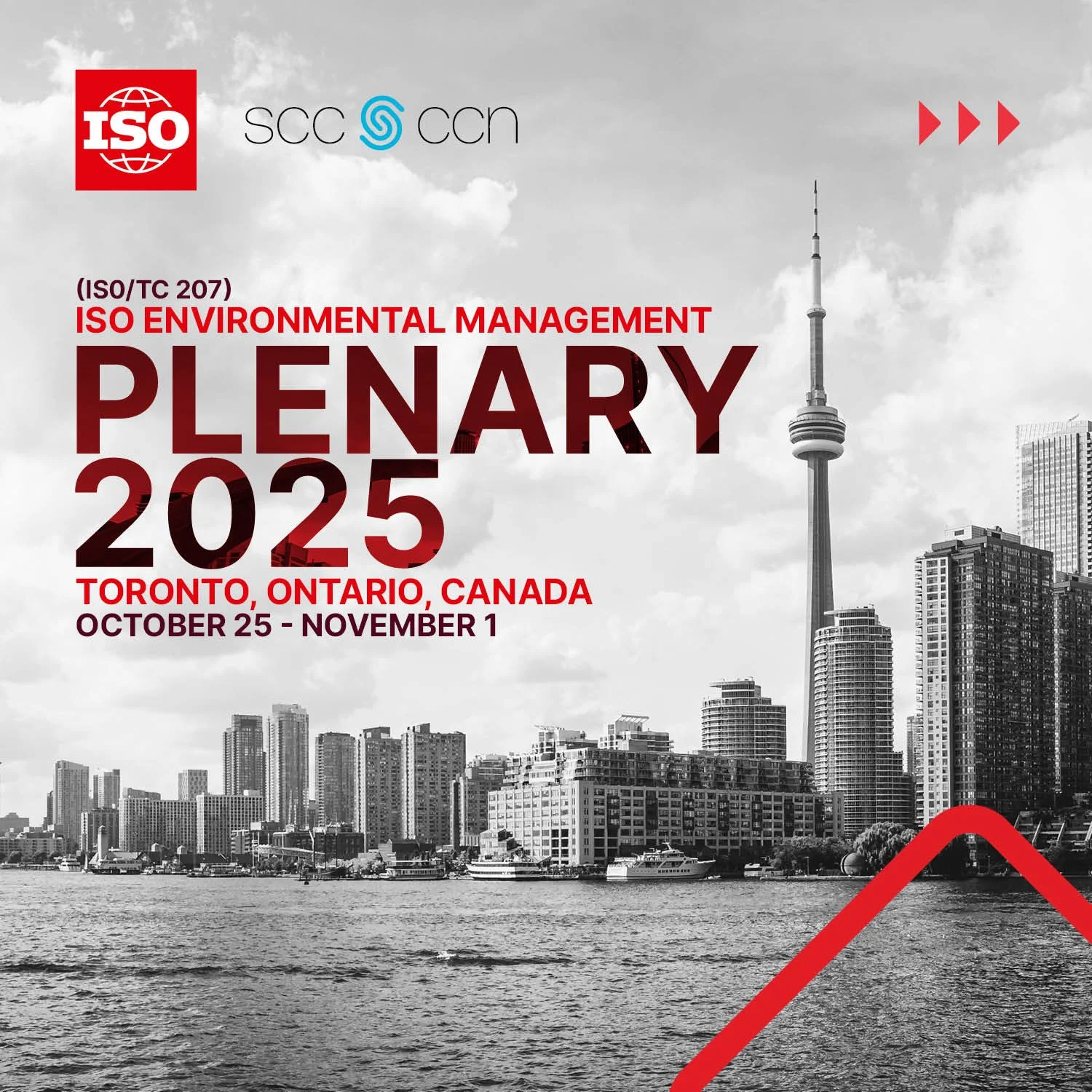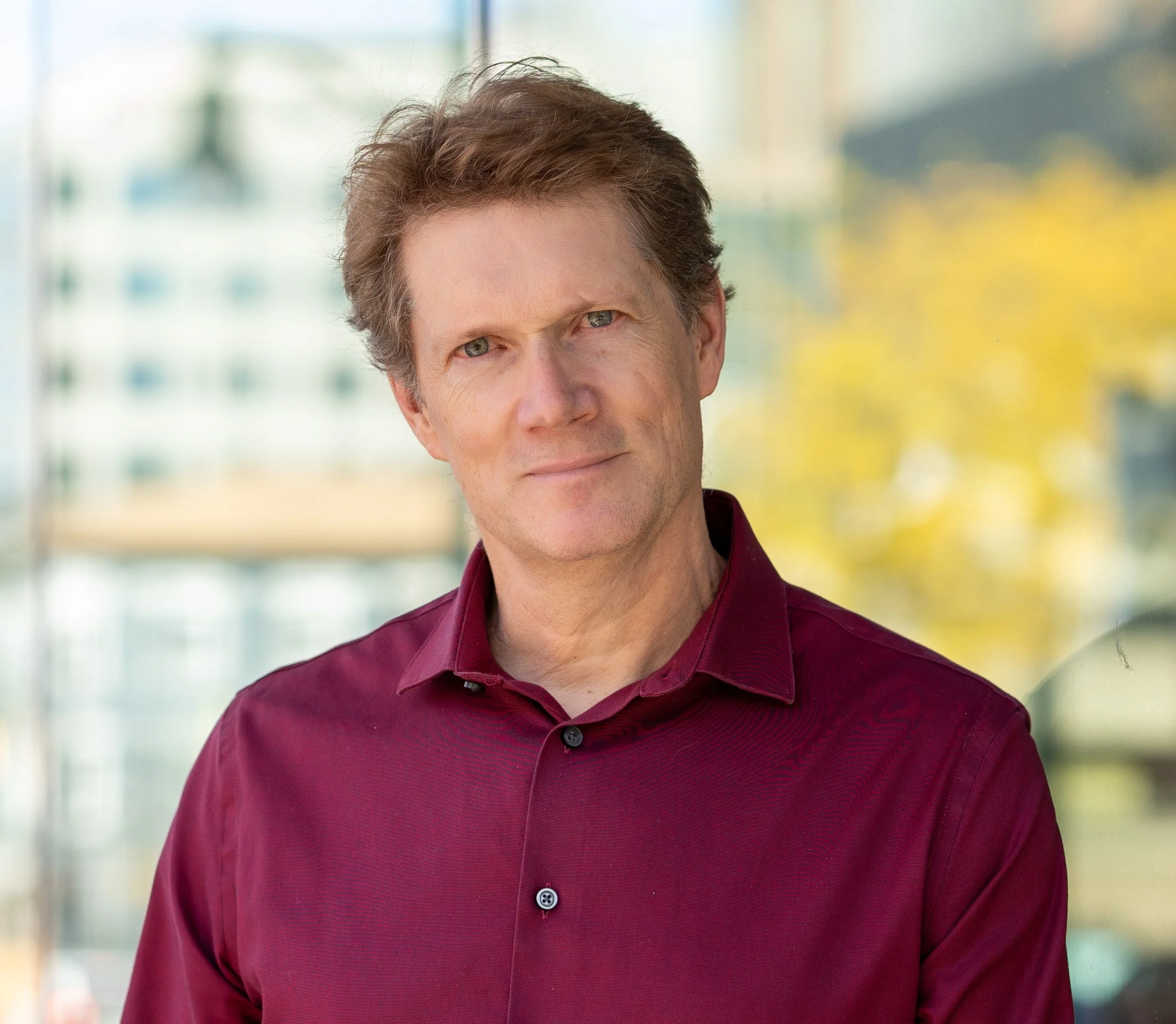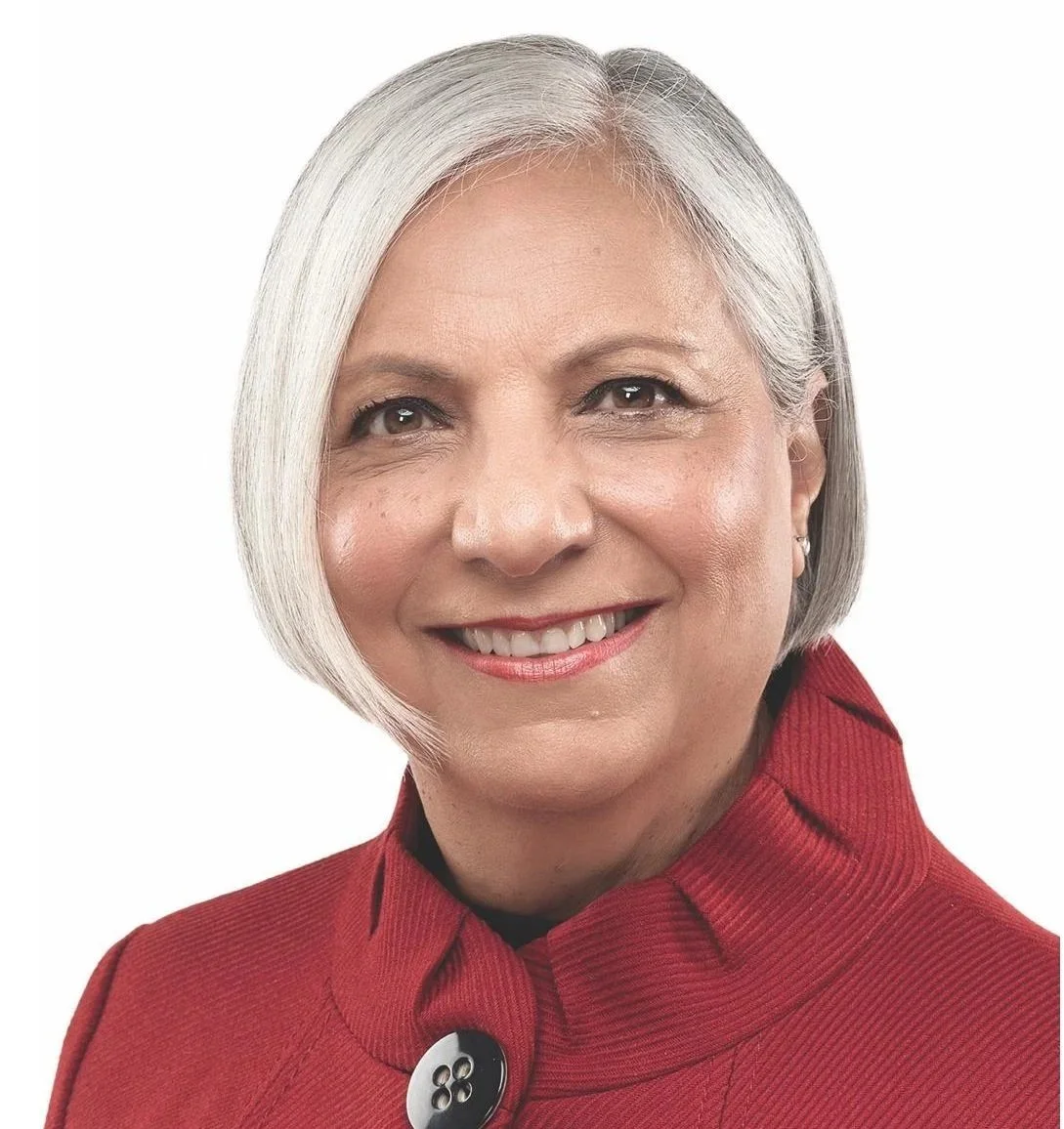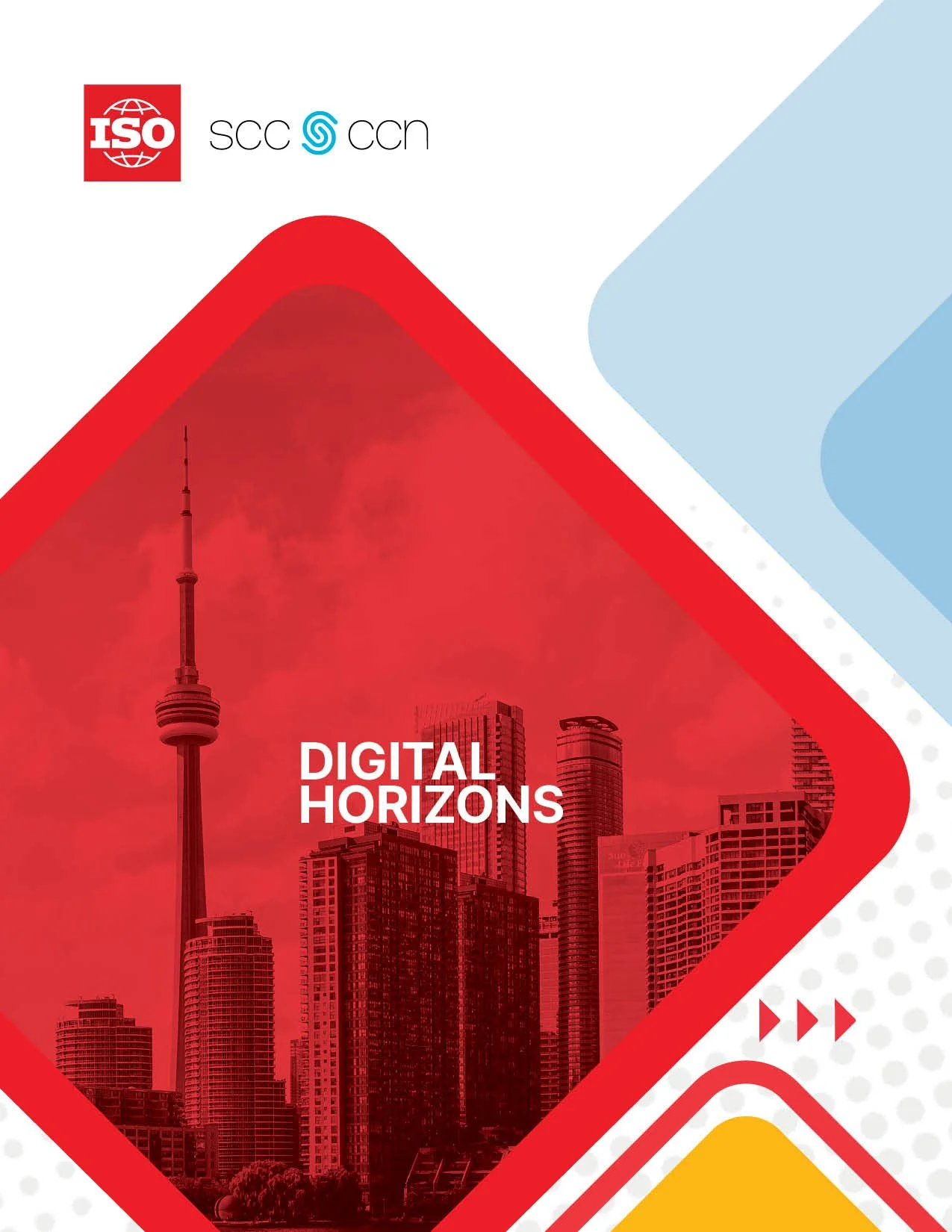
INNOVATION. INTEGRATION. IMPACT.
These three pillars reflect the role of standards in shaping a sustainable future — driving new solutions, aligning diverse efforts, and ensuring tangible outcomes for our planet.

ISO ENVIRONMENTAL MANAGEMENT (ISO/TC 207)
Plenary 2025
Plenary 2025 Sponsors
Where environmental leadership meets global visibility.
Contact us to learn more about becoming a sponsor.
DEAR DELEGATES
On behalf of the ISO Environmental Management technical committee (ISO/TC 207), we are delighted to welcome you to Toronto for the ISO Environmental Management International Plenary 2025. It is an honor to convene this global gathering of experts, professionals, and leaders dedicated to advancing environmental standardization.
Zakiah Kassam
Chair
ISO Environmental Management
Daniel Trillos
Twinned Chair
ISO Environmental Management
We encourage open discussion, collaboration, and innovation as we work together to shape the future of environmental management standards. Your expertise and contributions are invaluable in ensuring that ISO continues to provide practical, science-based, and globally accepted solutions to today’s environmental challenges.
Thank you for your dedication and participation. Let’s have a productive and engaging plenary session!
We will be updating the information about the Plenary 2025 shortly. If you would like more information, please download our Welcome Package below.
Event Schedule
WORKING GROUPS
Saturday Oct. 25
STTF,
SC1/WG15
SC3/WG10
SC7/WG4
SC7/WG8
SC7/WG18Sunday Oct. 26
SLG, STTF, SC1/WG15, SC3/WG10, SC7/WG4, SC7/WG8, SC7/WG18COMMITTEE AND SUBCOMMITTEE PLENARY SESSIONS
WELCOME DINNER
EVENING PANEL SERIES
Monday Oct. 27
ISO 14050, DCCG
SC1/WG15, SC3/WG10, SC3/WG11 SC7/WG4, SC7/WG8, SC7/WG18
Monday Oct. 27
Climate Risk in MDB InvestmentsMonday Oct. 27
Climate Resilience of Health Systems
Monday Oct. 27
Tracy Sletto, CEO Canada Energy RegulatorMonday Oct. 27
Sergio Mujica, ISO Secretary-GeneralTuesday Oct. 28
TG1, SC1/AH3, SC1/WG15, SC3/WG11, SC3/WG12,
SC5/WG12
SC7/CAG
SC7/TG1, SC7/WG4
SC7/WG8
SC7/WG18
Wednesday Oct. 29
SC1/WG11
SC1/WG15
SC3/WG10
SC5/WG12
SC7/TG3
SC7/WG5
SC7/WG13
SC7/WG18
Thursday Oct. 30
SC1, SC3, SC5SPECIAL SESSIONS (Closed)
SPECIAL SESSIONS (Open to ISO Delegates)
LUNCHTIME KEYNOTE SPEAKER
Thursday Oct. 30
SC5/WG12
Thursday Oct. 30
Canadian Young Leaders
Thursday Oct. 30
Climate Resilience of Water Infrastructure Systems
Thursday Oct. 30
David Burns, Director of Governance, Greenhouse Gas Protocol and Benoit Desforges, Chair of ISO Climate Change SCThursday Oct. 30
Natural Capital Accounting Joanna Eyquem (Vice President, Climate Risk Institute)
and
Martin Baxter (Chair, ISO Environmental Management Systems)
Friday Oct. 31
Saturday Nov. 1
Wednesday Oct. 29
SC2, SC4
Friday Oct. 31
SC7Saturday Nov. 1
TC207
Tuesday Oct. 28
Climate Risk in MDB InvestmentsWednesday Oct. 29
Friday Oct. 31
Sector-specific Workshops
Saturday Nov. 1
Canadian Young LeadersTuesday Oct. 28
Climate Resilience of Health Systems
Wednesday Oct. 29
Climate Resilience of Water Infrastructure Systems
Friday Oct. 31
Digital Horizons sessions (except for Sector-specific workshops)
Saturday Nov. 1
Tuesday Oct. 28
Dr. Myles Sergeant Executive Director, Canadian Coalition for Green Health CareWednesday Oct. 29
MGen Scott Malcolm, Surgeon General, Canadian Armed ForcesFriday Oct. 31
The Canadian Future ProjectSaturday Nov. 1
Naheed Nenshi, Leader of the Alberta New Democrat Party and Leader of Official Opposition of AlbertaTuesday Oct. 28
Digital Technologies for Sustainability Belén Suarez (CEO of GO to Innovation Intelligence)
and
Andres Ferreyra (Industry Data Standards & Collaborations Lead, Syngenta)
Wednesday Oct. 29
Pathways to Net Zero Rumina Velshi (Strategic Advisor at Torys LLP, Former President and CEO of Canadian Nuclear Safety Commission)
and
Daniel Trillos (Convener of ISO Net Zero working group, Twinned Chair)
Guest Speakers

FAQs About The Plenary 2025
-
The International Organization for Standardization (ISO) is a global body that brings together experts from across industries, governments, and civil society to develop voluntary, consensus-based standards that address some of the world’s most pressing challenges. With members from 170 countries, ISO provides a unique platform for international collaboration, ensuring that knowledge, technology, and best practices are shared to drive innovation and efficiency across sectors. In the face of accelerating environmental crises—ranging from climate change to biodiversity loss and pollution—ISO standards offer essential tools for businesses, policymakers, and communities to adopt sustainable practices, measure their environmental impact, and implement effective solutions.
By fostering global alignment on technical and policy frameworks, ISO helps create a common language for sustainability, enabling cross-border cooperation and strengthening collective action.
At the heart of ISO’s environmental work is the ISO Environmental Management Technical Committee (ISO/TC 207), which develops standards that support organizations in minimizing their environmental footprint and enhancing resilience to environmental risks. The committee’s flagship series, ISO 14000, provides globally recognized frameworks for environmental management systems, climate action, life cycle assessment, and sustainable finance, among other critical areas. These standards play a crucial role in guiding industries and governments toward greener economies, aligning environmental responsibility with economic growth. By bringing together experts from diverse backgrounds, the ISO Environmental Management Technical Committee ensures that standards are scientifically rigorous, practically implementable, and universally relevant—helping to accelerate the transition toward a more sustainable and climate-resilient world.
-
The Plenary will be held in Toronto, Ontario, Canada at the Ismaili Centre located at 49 Wynford Drive from October 25-November 1, 2025.
-
Residing upon the nearly 17-acre Aga Khan Park, the Ismaili Centre, Toronto was designed by award-winning Indian architect, Charles Correa. Fusing the rich traditions of Islamic architecture with contemporary forms and modern materials, Correa’s vision for the building was to have an ambassadorial space that would foster the understanding of pluralism, which was brought to life in partnership with local Toronto studio Moriya & Teshima Architects.
The 6th of its kind globally, the Ismaili Centre, Toronto is part of a network of Centres that include Vancouver, London, Lisbon, Dubai, and Dushanbe, Tajikistan in Central Asia. The 7th Ismaili Centre is under construction in Houston. The Centres are designed to convey the harmonious unions of spirituality, art, and nature while creating architecturally unique spaces for contemplation, cultural celebrations, and educational purposes.
In designing it, Charles Correa’s vision was to create a building that responds to the traditions of Islamic architecture in a contemporary design using modern materials. Through programmes ranging from lectures, seminars and exhibitions to cultural and social events, the Ismaili Centre creates an understanding of the values, ethics, culture and heritage of Ismaili Muslims, and of the work of the Aga Khan Development Network.
-
ISO P-member countries may be eligible for funding to support ISO technical work, including the activities that are being undertaken as part of the ISO/TC 207 International Plenary. The activities being undertaken need to be linked to the country’s National Standardization Strategy. There are three possible sources of funds which may be available to eligible ISO members to access.
1. ISO MEMBER-CHOICE SPONSORSHIP
In the framework of the ISO Action Plan for developing countries 2021-2025, ISO provides funded travel assistance to support the participation of its developing country members, who are eligible for ISO capacity building support, in the work of ISO. The sponsorship entitles travel assistance to five (5) meetings in a given calendar year and covers the cost of flights, hotel accommodation and other travel-related expenses for the chosen participant. ISO developing country members may request sponsorship to attend meetings of ISO technical committees (TC) or subcommittees (SC) or working groups (WG) linked to their national priorities.
2. ISO LEADERSHIP SPONSORSHIP TO LEAD ISO TECHNICAL WORK (COMMITTEE MANAGER, CONVENOR, PROJECT LEADER)
This new sponsorship programme is piloted under the framework of the ISO Action Plan for developing countries 2021-2025. Funded travel assistance is made available to support the participation of selected leadership positions (committee manager, convenor, project leader) held by developing countries eligible for ISO capacity building support.
The sponsorship provides travel assistance for up to two (2) leadership positions per calendar year and per country and covers the cost of flights, hotel accommodation and other travel-related expenses. For 1-day meetings, we strongly encourage online participation.
The ISO sponsorship is not available to attend meetings of technical or strategic advisory groups (SAG or TAG), the Chairs meetings, CAG meetings, the Technical Management Board (TMB) and Plenaries of CASCO or COPOLCO or DEVCO.
3. ISO PROJECT SPONSORSHIP
This sponsorship programme is implemented under the framework of the ISO Action Plan for developing countries 2021-2025. This sponsorship programme is available for selected ISO projects, for which an announcement is made via ISO documents of the respective TC/SC.
How to request sponsorship?
All requests for sponsorship should be sent by email to sponsorship@iso.org, with copy to the CEO or equivalent of your NSB. The e-mail should provide:
The exact title of the meeting;
Dates and venue (city, country) where the meeting will take place;
The name of the candidate for whom sponsorship is requested; and
A copy of the agenda.
Email a request to: sponsorship@iso.org
-
Experience the beauty of Niagara Falls, located on the Canada/United States border, formed by the Niagara River connecting Lake Erie to Lake Ontario. It is approximately a 1.5 hour drive from the Ismaili Centre by car, or 2 hours with public transportation.
Niagara Falls is one of Canada’s iconic natural wonders and is consistently ranked among Canada’s top tourist attractions, hosting over 13 million visitors annually with its natural beauty and rich cultural heritage. Beyond its breathtaking views, the falls hold historical significance as a site of Indigenous gatherings and colonial trade routes, while modern attractions like the Maid of the Mist boat tours and illuminated evening displays showcase its operational blend of adventure and accessibility.
The region emphasizes renewable energy through hydroelectric power generation and protects natural ecosystems via initiatives like the Niagara Glen Nature Reserve and Botanical Gardens. Niagara Parks’ commitment to conservation, including waste reduction and climate action, reflects a dedication to balancing tourism growth with environmental stewardship, supporting principles of sustainable development that resonate with global green efforts.
Ripley’s Believe It Or Not, also in Niagara Falls, is a playground for the curious, offering a wild journey through the bizarre and the extraordinary. This tourist attraction has more than 400 exhibits and is a hub for education and hands-on fun.
Edwards Gardens, located 2.3 km away from the Ismaili Centre Toronto, offers botanical diversity and seasonal displays, aligning with ecological stewardship through plant conservation and educational programs.
Casa Loma, Toronto’s iconic Gothic Revival castle at 1 Austin Terrace, was built in 1914 by financier Sir Henry Pellatt, featuring 98 opulent rooms, secret passages, and five acres of manicured gardens. Now a museum and event venue, it attracts over 650,000 annual visitors.
Ripley’s Aquarium of Canada, located near Toronto’s CN Tower, captivates visitors with 20,000+ aquatic creatures from tiger sharks to glowing jellyfish and is North America’s longest underwater viewing tunnel. You will experience a huge offering of immersive encounters with marine life
The CN Tower, standing at 553 meters (1,815 feet), dominates Toronto’s skyline with its main observation level (346 meters) and SkyPod (447 meters) that offers panoramic views of Lake Ontario and the city. Thrill-seekers can brave the EdgeWalk, a hands-free walk 356 meters above ground, while others enjoy the glass floor or dine at the revolving 360 Restaurant.
Trillium Park, located at 955 Lake Shore Boulevard West, is a revitalized waterfront gem born from the Ontario Place revitalization project. Opened in 2017, it blends Indigenous heritage with ecological design, featuring the William G. Davis Trail - a 1.3-kilometer path offering skyline and Lake Ontario views - and the Ravine with Moccasin Identifier, a stone-carved tribute to First Nations history.
Scotiabank Arena, Toronto’s premier multi-purpose venue at 40 Bay St., hosts the National Hockey League’s Toronto Maple Leafs games, National Basketball Association’s Toronto Raptors games, and major concerts.
The St. Lawrence Market offers Toronto’s diverse food culture through local specialties, artisanal goods, and global cuisine. A historic hub blending Victorian charm with vibrant energy, it’s a must-visit for foodies and culture lovers seeking authentic experiences, from fresh produce to handmade crafts.
The Halloween Parade is a hit with tourists with its free, pedestrian-only street party featuring amazing costumes, live performances, and after-parties at LGBTQ+-friendly venues. This iconic event transforms six blocks of Church Street into a vibrant spectacle, blending creativity, community, and spooky fun.
Toronto’s City Hall captivates visitors with its iconic curved towers and modernist architecture, offering guided tours of its council chamber and panoramic city views from the 27th-floor observation deck.
-
The ISO Environmental Management Technical Committee working group meetings are open only to official delegates of National Standards Bodies and official liaison organization. Given the scope and the objectives of the Climate Resilience of Health Systems, Climate Resilience of Water Infrastructure systems, and the Digital Horizons programs, these programs are by invitation only. If you believe you can make a contribution to these discussions and wish to be considered for an invitation, please e-mail us.

ISO Environmental Management (ISO/TC 207)
Sustainable Development Policy
International Plenary 2025
Introduction
The ISO Environmental Management Technical Committee (ISO/TC 207) develops environmental management standards to address environmental and climate impacts, including related social and economic aspects, in support of sustainable development. The ISO Environmental Management International Plenary 2025 will bring together technical experts and representatives of National Standards Bodies from around the world to advance the development and application of environmental management standards.
We recognize that as developers of international standards in support of sustainable development, we have a duty to lead by example. As part of our commitment to sustainability, we will establish, implement, maintain and continually improve an Event Sustainability Management System (ESMS), guided by ISO 20121:2024.
SCOPE
This policy applies to all aspects of the ISO/TC 207 International Plenary 2025, including venue operations, event logistics, procurement, engagement with interested parties, and legacy planning.
IMPLEMENTATION AND MONITORING
To ensure adherence to this policy, we will:
Identify and comply with any applicable legal requirements and applicable sustainability requirements of our event partners.
Establish clear sustainability objectives and integrate them into event planning and decision-making processes.
Conduct regular assessments of environmental and social impacts and take corrective actions as needed.
Measure, track, and publicly report on key sustainability performance indicators, including waste diversion rates, carbon footprint, and inclusivity and public engagement.
Provide sustainability training and guidelines for all interested parties, including volunteers and suppliers.
CONTINUAL IMPROVEMENT
We recognize that sustainability is an ongoing journey. We are committed to continual improvement of our ESMS. We will monitor the adequacy and effectiveness of the ESMS and adjust our actions and the ESMS as necessary to improve our sustainability performance.
COMMUNICATION
This Sustainable Development Policy will be communicated and made available to all interested parties involved in or contributing to the ISO Environmental Management International Plenary 2025. This Sustainable Development Policy will be publicly available on the ISO Environmental Management technical committee website.
SUSTAINABILITY COMMITMENTS
We are committed to the following principles and objectives:
Environmental Protection
Resource Efficiency: We will minimize energy, water, and material consumption through responsible resource management.
Pollution Prevention: We will minimize the use of supplies and materials that can result in contaminant releases to the air, land or water considering life cycle principles. No single-use plastic materials will be used at the event, and we will promote reuse, recycling, and composting.
Greenhouse Gas Mitigation: We will assess the carbon footprint of our procurement and operational choices and seek to minimize our carbon footprint. We will transparently report on the greenhouse gas footprint of the event with the goal of achieving carbon neutrality.
Social Responsibility
Inclusivity and Accessibility: The event will be designed to be inclusive and accessible to all participants, considering physical, cultural, and linguistic diversity.
Engagement with Interested Parties: We will actively engage with delegates, local communities, suppliers, and service providers to promote sustainability awareness and to leverage the event to achieve broader community impact.
Well-being and Safety: We will prioritize the health, safety, and well-being of all participants.
Economic Responsibility
Sustainable Procurement: We will prioritize suppliers and service providers that adhere to sustainable practices, including ethical sourcing, fair labor policies, and environmentally responsible operations.
Local Economic Impact: We will seek opportunities to support local businesses and communities by sourcing locally wherever possible.
Legacy and Knowledge Sharing
We will document and transparently share our sustainability approach, performance, and lessons learned with interested parties to achieve wider outcomes and support interested parties in the implementation of an ESMS for future events.


































